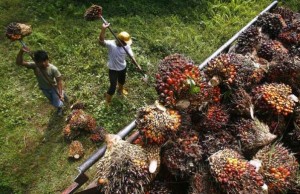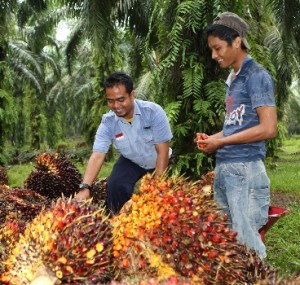It is known that the palm oil industry is causing major deforestation and carbon emissions, and some NGOs have reported companies committing human rights violations, land grabbing, and impoverishment of workers. If these things were true, then why do local farmers prefer working with oil palm?
The African Oil Palm is a very lucrative crop. In fact, it is the most lucrative crop in Indonesia on a land area use basis. Those attracted to working in the palm oil industry are often poor, rural village farmers. Oil palm is still fairly new to the area and most farmers do not have the knowledge necessary to produce high quality crop, nor do they have the capital to invest on their own. There is also generally a positive view on working in palm oil within the culture, as it is represented as a means to improve one’s social standing. Televised commercials promoting the prospects of working in palm oil are also not uncommon.

In Indonesia, most palm oil companies operate under a type of land sharing contract with the local owners of the land. These contracts are variations of the Nucleus Estates & Shareholders (NES) scheme, a joint venture model between companies, the government, and smallholders. Under this scheme, farmers in a village will cede their land (generally around 10 hectares per family) to the company and in return, they will own 2 hectares of the plantation, and the company will manage the planting, the working of the land, and the quality of the crops. These smallholders will also receive a portion of the revenue from the harvests. This is a fairly good system, as it benefited the companies, allowing them to easily obtain large areas of land, and also benefited village farmers, who could give up partial ownership of their land in exchange for a reduction of labor, an increase in profit, and a stake in the company. By participating, farmers also gained access to technical help from the company as well as better seeds and seedlings, (although this may be a dubious corporate scheme to establish dependency) increasing the likelihood of success and profitability of the plantation venture. A study in the district of Bungo, Indonesia, showed that the most common contract in that region was the 70/30 contract, in which smallholders receive “consolation fees” for 70% of the land and retain ownership of 30% of the land. However, these smallholders must also pay for the planting costs of their land. With the growing demand and price for land, farmers have recently become more reluctant to give up their land in this form of contract and companies have started drawing up 60/40 contracts to provide further incentive.

In this sense, the 70% (or 60%) of the land which is owned by the company is the “nucleus” and the rest that are owned by smallholders are called the plasma. The smallholders also form the plasma cooperative, for which a leader is chosen among them to represent their interests to the company. Richer smallholding families may wish to entrust their land to the plasma cooperative, which will hire and pay for workers to work their land for a monthly fee. The companies also offer work in their refineries, which is considered locally to be a good job, as it moves away from farming and is seen to be the next step on the social ladder.
However, the NES style contract can have its problems. Ideally, it is a win-win situation between the smallholders and the companies. However, there are other factors involved. In a typical NES style contract, the local government oversees the process of land titling for the smallholders and the bank keeps these titles as collateral for initial plantation development and management costs on these lands, as most of these village farmers lack the capital to develop their land on their own. The company then handles the repayment of these debts until they are cleared. The smallholders decide the percentage of monthly net added value (NAV) they wish to put toward the repayment of their debt. The main issue that may arise is that the debt fails to be repaid, which may be caused by a multitude of factors, including the failure of the plantation, a mismanagement of how much NAV is used to repay, the bank’s interest rates, the leadership of the plasma cooperative, among other things.
Another issue is that contracts are drawn in complicated legal jargon and most farmers do not fully read the contacts, and those that do are often confused by their wording. These farmers will usually rely on spoken agreements mediated by government officials, which may or may not be true to the contract. Generally, the land is given to the company for temporary ownership for the length of the crop’s lifespan (roughly 25 years), but ownership of the land after that period is often left vague in the contract. Most village farmers in Indonesia do not formally own their land and the title of the land is informally recognized as belonging to their family, since they have lived on and farmed the land for many generations.
In the same study mentioned earlier in Bungo, one of the main cooperatives in the district was met with great success. By 8 years after planting, 90% of the smallholders had repaid their debt to the bank. Operating debt free, these smallholders were earning an average of €440/month for a 2 hectare plot of land during the palm oil boom of 2008. Joining a NES type venture is still a gamble, but it is one that often works out when there is good and honest leadership in the parties involved. It gives these farmers a chance to lift themselves out of poverty. Unfortunately, recent price drops in palm oil has been causing problems in prospects of new ventures. To read more about the livelihood impacts on Indonesian smallholders, click here. Currently, roughly one third of Indonesian palm oil land is owned by smallholders.
Due to the benefits of the palm oil industry to the livelihoods of Indonesian smallholders and migrant farmers, as well as high global demand, it is impractical to attempt to persuade farmers and smallholders to seek alternative means of income. It has been shown that REDD programs to award carbon credits to farmers who reduce their carbon emissions will not be successful as the costs and effort required to do is much more than carbon credits, which can only be traded with certain organizations, are worth. Fortunately, there are solutions in terms of sustainability training and certifications (RSPO). Some chemical companies have endeavored to switch to RSPO certified palm oil in the near future.